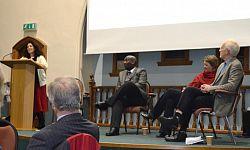THET project: Rwanda Spotlight
Professor Scott Murray, St Columba’s Hospice Chair of Primary Palliative Care hosted an evening in Bellevue Chapel on October 6th for those with an interest in Palliative Care and the exchange of learning between Africa and Scotland.
Three visionary speakers shared recent experiences of strengthening and integrating palliative care in health services in Africa with specific reference to Rwanda. Dr Mhoira Leng, Head of Academic Palliative Care at Makerere University in Kampala set the scene by highlighting the considerable global challenges facing palliative care integration. In identifying three key objectives of reducing suffering, improving quality of life and restoring dignity she quoted the overarching principle of “Adding life to days, not just days to life”.
She focussed on the Palliative Care global imperatives identified in the historic resolution of the World Health Assembly in May 2014, “to develop, strengthen and implement, where appropriate, palliative care policies to support the comprehensive strengthening of health systems to integrate evidence-based, cost-effective and equitable palliative care services in the continuum of care, across all levels, with emphasis on primary care, community and home-based care, and universal coverage schemes.”
Speaking from her own experience of health system strengthening at Makerere Palliative Care Unit (MPCU) in Mulago Hospital, Uganda, she outlined the main challenges around integrating Palliative Care within government services. It was important to develop and support a strong evidence based practice, to improve access to quality care and to influence the attitudes, beliefs and values of a health system such that Palliative Care would be recognised, owned and delivered effectively.
We do this by delivering an integrated clinical service within the national referral hospital site in Uganda; carrying out research training and capacity-building in collaboration with partners; and developing leaders in Palliative Care
There are three main strands to the research agenda at Makere:
- Patient needs and perspectives. The MPCU needs assessment, involving a review of 267 notes and 78 interviews, provided a baseline for advocacy and planning. (Lewington, Namukwaya, Limoges, Leng and Harding. BMJ Support Palliative Care 2012;2:140-144)
- Staff needs and perspectives. Curriculum integration, training, clinical placements, mentoring and capacity building have had a significant impact on the strengthening and integration of Palliative Care in Mulago hospital.
- Frameworks and models of care. The MPCU Link Nurse programme and volunteer programme has transformed the provision of palliative care as is evidenced in feedback quoted by Dr Leng; “As a link nurse I have come to know that patients are individuals with different problems, so I handle them at the individual level. Also the concept of team work has made me get very close to the palliative care team so we work hand in hand. Patients have become ours not theirs”.

Dr Liz Grant, Assistant Principal, Global Health and Director of the Global Health Academy, University of Edinburgh gave an overview of the THET funded project “Strengthening and integrating palliative care into national health systems through a public health primary care approach in 4 African countries to contribute to meeting the targets of MDG goal 6”. She spoke of the project goal to integrate palliative care into systems, policies, practice and communities so as to provide better, earlier palliative care services for more patients in a timely and effective manner. 12 hospital hubs in 4 countries; Kenya, Rwanda, Uganda and Zambia have been established with a role to manage referrals, to foster and provide clinical leadership and coordination, to enable access to essential medicines including morphine, to offer training assessment and support and to partner with mentors. Training at different levels from high level advocacy to clinical placements to basic sensitisation provides vital strands in ensuring the sustainability of the project. Service delivery is enhanced as each hospital with its satellite and health posts in the community offers an integrated approach to palliative care.
Rwanda spotlight
The THET project is a collaborative programme with three main partners (University of Edinburgh, Africa Palliative Care Association and Makerere Palliative Care Unit) working with different organisations in each of the four countries. In Rwanda the project is managed through the Ministry of Health and is focussed on shaping policies, providing morphine frameworks, training, mentoring, clinical placements and diplomas. Advocacy is happening in all three hospitals with committed palliative care champions and Dr Grant is delighted with the opportunity the project has to co- fund a new position within the MOH for National Palliative Care.

Dr Christian Ntizimira, Palliative care coordinator for the Rwanda Ministry of Health took to the stage to comment on the advantage of working with a project whose main focus isn’t solely that of human resources. He prizes the comprehensive approach with a focus on integration working closely with government and through the public health system.
The government of Rwanda has seen the evidence based approach of the THET project in the 3 hospitals and now is planning to duplicate and roll out the same model in other hospitals at district, provincial and teaching hospital levels.
This approach was really, really helpful….This would be one of the best programmes working with all African countries and governments because it is well designed according to the needs we share in Africa
Dr Ntizimira is in the UK at the invitation of the University of Edinburgh and also THET project mentors; all UK based senior Palliative Care practitioners. Having attended a course at St Christophers Hospice, he visited Mary Stevens Hospice in Stourbridge and St Columba’s Hospice in Edinburgh. Speaking warmly of the way he was welcomed into the UK palliative care world, he has clearly listened, observed and learned from his encounters. The cultural differences have given him much to ponder, what might be transferable practice and what is inappropriate for the care of the dying in a post genocide nation.

He observed a sharp distinction between the roles the family plays in the UK and in Rwanda commenting, “In my country when you are well you belong to yourself, when you are ill you belong to your family. In the UK when you are well you belong to yourself and when you are ill you belong to yourself”. He has seen the exceptional care offered in UK hospices but wonders if the patients are lonely and feel abandoned by family.
In Rwanda the family has a strong voice and everyone gathers to consult on the patient’s care. The challenge for him, perhaps, is how to take the best of the UK hospice movement and blend it with the best of the vibrant Rwandan family culture? His challenge to his listeners is how we bring the dying into the heart of our communities?

